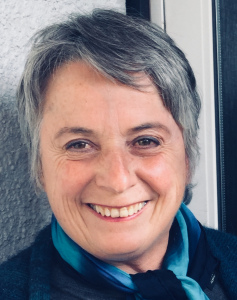"I’ve often gained confidence in things I find difficult to do by organising events around them."
When Jude Higgins retired at 60 it didn't remotely occur to her to stop creating opportunities to get people together and share stories. In a beautiful, warm piece Jude explains how she was inspired to get involved in running the Bath Short Fiction Award and how she has built a whole family from this community. A piece about the threads that bind us together.
Jude Higgins is a writer, writing tutor and mentor, organises the Bath Flash Fiction Award and directs Flash Fiction Festivals UK. She has won, been placed or listed in many short fiction contests and is published in several literary magazines including The New Flash Fiction Review, Flash Back Fiction, The Blue Fifth Review, Flash Frontier, and The Nottingham Review among other places. Her debut flash fiction pamphlet, The Chemist’s House was published in 2017 by V. Press and was recently long listed for the short story collection category of the Saboteur Awards 2018.
Transcript below:
Other People
At 60, I retired from my work as a Gestalt Psychotherapist a career I’d followed for around 25 years. In my work, I often supported and encouraged people to follow their creative dreams so it was natural for me to think of new creative ventures after retirement. Fast forward a couple of years through an MA in creative writing and a partly finished novel and you’ll find me in a workshop about flash fiction with writer Tania Hershman. I quickly became addicted to the form. And soon founded the Bath Flash Fiction Award with the aim of increasing knowledge of this exciting genre and getting others to read, write and listen to it.
I’ve often gained confidence in things I find difficult to do by organising events around them to motivate myself. In my early thirties I ran Assertiveness Training Groups for women . Even though I was very shy I was good at this and I did become more assertive. Running the Bath Flash Fiction Award means that I’ve read thousands of micro fictions in the last three years. It’s had a big and positive affect on my own writing and I’ve had publishing success – a high point being publication of ‘The Chemist’s House’ my flash fiction chapbook. But so many other benefits have emerged, one of which is being part of the flash fiction writing community on social media and elsewhere. As someone with no children or extended family, the people in this large diverse group of world-wide flash fiction writers seem like a family group – a family with many shared interests. And I learn so much about different lives and cultures via the brilliant short fiction shared every day online. Meeting writers face to face at last year’s Flash Fiction Festival which I directed was an added bonus. Age differences don’t seem to matter in this community. I’m 68 at the end of May and fully expect to think of many more creative opportunities for myself and others in the coming years. I don’t live alone but the micro fiction I am going to read is about the way people can be connected through out the world, even if they are alone. It was inspired by a prompt to write in the second person in ‘Flash Follies’, an online group I was involved with and in 2017 the story won one of the monthly flash fiction contests run by The Word Factory on the theme on Citizenship, Identity and Belonging.
Other People
Since she’s been alone, your friend in Australia helps rescue pilot whales stranded in shallow water. The woman down the road drives for a living with the radio on for company. That neighbour of yours, whose wife left last year, is excited by string theory and writes perfect algorithms.
You’ve just binned the old clothes from your previous life, mixed and matched a capsule wardrobe and begun collecting garden gnomes. You like those concrete mouldings of tiny, cheerful men. One’s perched with a fishing rod at the edge of the goldfish pond and your favourite gnome is calmly smoking a pipe in a bed of primulas.
Sometimes, on a lonely night when the moon is full, you imagine those other people outside too. That woman you scarcely know has driven for miles hardly needing the headlights because the sky’s so bright. In a quiet lane, she’ll climb on to the roof of her van, lay flat and gaze at the Milky Way. Your neighbour, with his telescope focussed, will decide that no equation can ever fathom the mysteries of the universe. On the other side of the world, your friend will be out in a boat watching rescued whales breach a moonlit ocean.
In the garden, you sit on a stone, motionless like the gnomes, not minding that your classic trench coat is creased, or your designer jeans are muddied. You tilt your face towards the sky while the man in the moon looks down. And you don’t feel sad.

